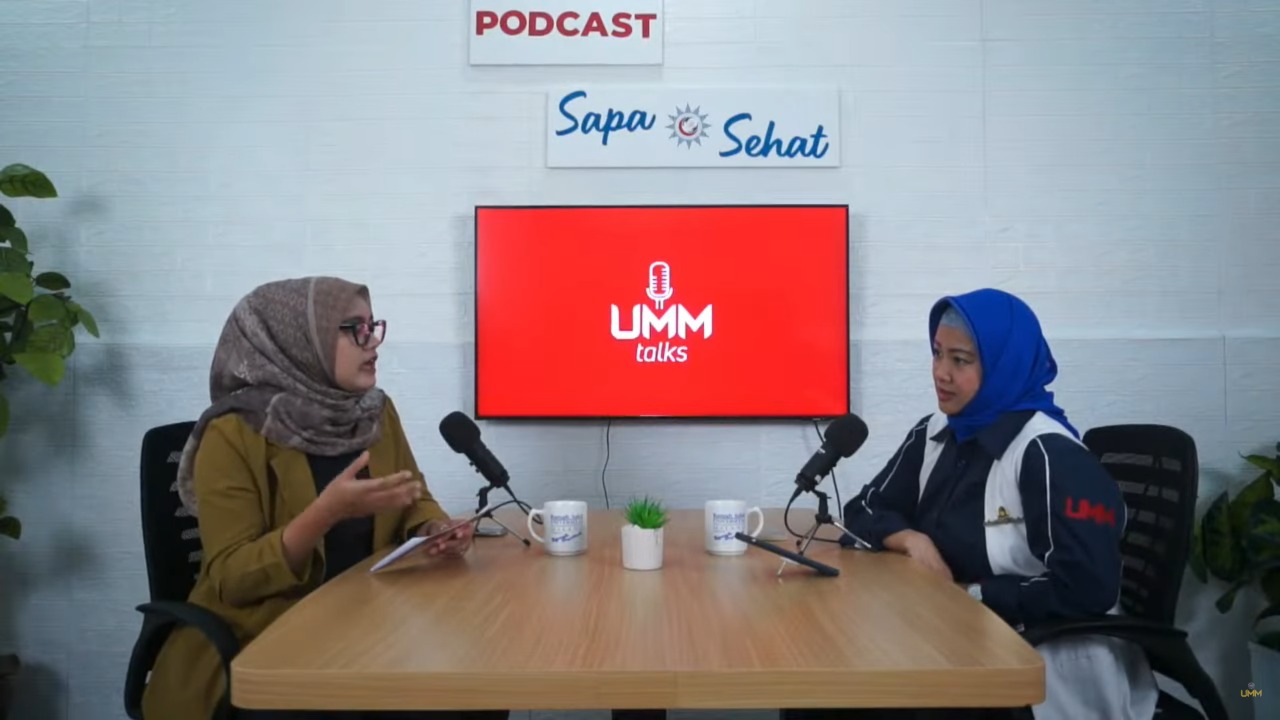 |
| dr. Pertiwi Febriana Chandrawati, Sp.A., M.Sc. as Head of the Department of Pediatrics, Faculty of Medicine (FK) University of Muhammadiyah Malang (UMM) in the UMMTalks Program. (Photo: Istimewah) |
The Ministry of Health informed that at least the data collected on Friday (21/10) showed there were 241 cases of kidney failure in children, and 133 died. Reportedly, the death was caused by the use of syrup. Responding to this, dr. Pertiwi Febriana Chandrawati, Sp.A., M.Sc., as the Head of the Department of Pediatrics, Faculty of Medicine (FK) Universitas Muhammadiyah Malang (UMM), took a stand and explained the UMMTalks program. It was mainly related to whether this syrup is the cause of certain diseases in children.
Read also: UMM Trains BK Teachers in Malang, Overcomes Student Trauma After the Kanjuruhan Tragedy
Pertiwi, as she is known, explained that kidney failure causes an increase in creatinine. Namely, a decrease in blood function and a decrease in urine or urine cannot come out. According to data from the Ministry of Health, there are two criteria for suspected kidney disorders in children: Oliguria and Anuria.
“Oliguria is urinating very little for 6 to 8 hours. So, for parents with one-year-old children, it means at least 6-8 hours to change diapers. If it turns out that there is still a little urine after checking the diaper, it means that you have to be careful because it could be that you have Oliguria. Anuria is the absence of urination for 12 hours or more. You have to be careful with this because you are afraid it will lead to kidney problems,” explained the lecturer in Pediatrics at FK UMM.
Read also: Sending 40 Volunteers, UMM Maharesigana Quickly Help South Malang Flood Victims
Furthermore, he explained the relationship between syrup and kidney failure. For him, all syrups or liquid drugs must have a solvent. The safest solvent to use is polyethylene glycol or polyethylene oxide. Both have safe limits internationally and by the Food and Drug Supervisory Agency (BPOM). Some solvents cannot be used on humans, namely ethylene glycol and diethylene glycol.
"Ethylene glycol or diethylene glycol is a solvent usually used for industry, not humans. The side effects if consumed by children will make them dizzy, vomit, and possibly the worst is kidney problems, "explained Pertiwi.
Reflecting on the case of the Gambia, it has been confirmed that several syrup drugs use prohibited solvents and cause kidney failure. As a preventive measure, Pertiwi urges parents to refrain temporarily from giving their children syrup. In line with what is recommended by BPOM, the Ministry of Health, and the Indonesian Pediatrician Association (IDAI). Instead, he suggested using powder medicine.
"For children to want to drink powdered medicine, they can use homemade sweeteners. Be it sugar or sweet tea. Those two steps are quite effective for a while," he suggested.
In addition, Pertiwi also provides solutions for parents who want to care for their children's health or when sick. For example, if you have a fever, a step that can be taken is to check using a thermometer.
"If the fever is below 38 degrees, don't rush to give medicine. Drink a lot first so that you pee a lot and the heat goes down. But if it reaches 39-40 degrees Celsius, immediately take it to the nearest doctor, "said the doctor, who is also the Head of Children's School and Perinatology UMM Hospital.
He also emphasized maintaining endurance and not stress. Especially in the recent weather. Not only for children but also for parents. Some things that can be done are sunbathing in the morning, adjusting sleep patterns, eating nutritious foods, and taking vitamins. (cdr/ros/wil)